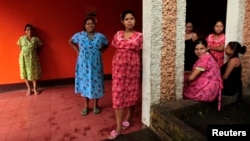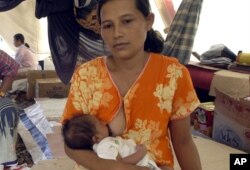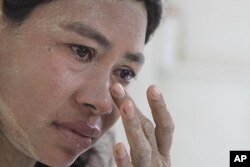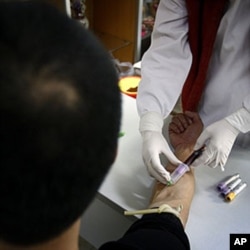Early access to prenatal care and testing for HIV and syphilis are credited with making Thailand the first Asia-Pacific country to eliminate mother-to-child transmission of the two sexually transmitted infections. Global health officials say Thailand is the first country with a large HIV epidemic to ensure "an AIDS-free generation."
Thailand’s achievement is based on sustained political commitments by successive governments, said World Health Organization spokeswoman Mukta Sharma.
New HIV cases down
Thailand was "among the first countries to look at trials of anti-retroviral drugs that stopped transmission and they were the first ones to use that science very systematically from the very beginning from about 2000 onwards," Sharma told VOA.
Between 2000 and 2014, the number of new HIV infections among women in Thailand fell by almost 90 percent, from 15,000 to 1,900, say health officials. Last year, 86 children were born HIV-positive in Thailand – well below the levels of a decade ago, when the figure stood at around 1,000.
Without treatment, women living with HIV have a more than 30 percent chance of transmitting the virus to their children during pregnancy, labor, delivery or breastfeeding.
The risk drops to just over 1 percent if antiretroviral medicines — which slow the rate at which HIV multiplies in the body — are given to both mother and child throughout the stages when infection occurs.
Thailand’s Ministry of Public Health said 98 percent of all HIV-positive pregnant women there have access to antiretroviral therapy leading to rates of mother-to-child transmission being reduced to less than 2 percent. HIV testing for this group of women in Thailand is the highest in the Asia-Pacific region.
WHO’s Sharma says such a policy has delivered results to the general community.
Pre-natal care, antiretroviral therapy
"Every woman who was pregnant who was coming into health care was actually being screened for HIV, and every person who was then deducted as having HIV was provided with free antiretroviral drugs,” she said.
“The baby was assessed and also provided with treatment. So overall, the very strong health infrastructure in the country, the very good universal health coverage, the very high coverage of antenatal services, really helped the Thai government to do this,” she added.
While numerical gains have been praised, the personal tragedy for women and threat to their newborn children from HIV remains.
UNAIDS says Thailand has an estimated 200,000 females age 15 or older who are HIV-positive, with around 7,000 children under age 14 carrying the virus that causes AIDS.
Father Joe Maier, whose Human Development Foundation in 2000 opened a home in the Bangkok slum community of Klong Toey for mothers and children living with HIV/AIDS, says poverty, poor education and a lack of awareness leave young women vulnerable.
“Those who are wise, those who are educated or close to a doctor, they would eat pills before birth and the number of babies with AIDS would go down somewhat," Maier said.
"But the rest are poor. They don’t have any milk and so you get AIDS mummies giving milk to AIDS babies and the chances of the babies getting AIDS from mummy’s milk is about one out of three. And they don’t have any money to eat and they don’t have any jobs — so we give out lots of milk,” he said.
Rates of new HIV infections in the general population have also declined to around 10,000 a year from 140,000 registered in the early 1990s.
AIDS activists, however, say Thailand’s progress in curbing the pandemic has stalled. The rate of new HIV infections has only shown a slight decline in recent years with about 8,000 people becoming infected each year while AIDS-related deaths remain at close to 20,000 a year.
Educating youth
There are troubling signs among key populations, Maier said. HIV-positive teenage boys and girls believe they're impervious to the disease, he says: "So the kids [who] have been taking their meds for years stop. So then the AIDS comes back and they die. So that’s our biggest problem right now.
The WHO’s Sharma also sees challenges to ensure the gains in reducing mother-to-child HIV transmission are sustained.
"The challenges will be that you have to keep the focus on the issue. And right now, there are so many other problems the country is facing in terms of health: aging, noncommunicable disease, cancer.”
"But keeping the focus on HIV – and ... keeping the focus on ensuring that no child is born with HIV – it’s going to be something that’s going to require a fair amount of effort," Sharma said.
The Public Health Ministry hopes to build on the three decades of gains in corralling the AIDS pandemic with a goal of eradicating the disease by 2030 in the country of nearly 70 million people.
In addition to Thailand, the WHO recognized Belarus for eliminating mother-to-child HIV and syphilis transmissions. The organization also credited Armenia and Moldova for eliminating transmission of HIV and syphilis, respectively. Cuba achieved both goals last year.
"This is a tremendous achievement — a clear signal that the world is on the way to an AIDS-free generation," Dr. Margaret Chan, WHO's director-general, said this week in recognizing the countries.







